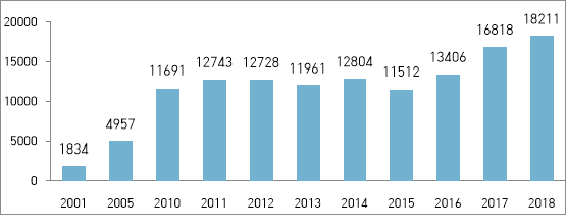|
Sales of key South Korean bookstores
2019.07.08
Today in many countries, online bookstores are a solid part of their publishing distribution networks. Up until the early 1990s, only physical bookstores of varying scale existed and readers' selection of books was based on book displays and how accessible the stores were. However, following the emergence of Amazon in 1995, online bookstores have solidified their position as key sales channels of the publishing industry in countries around the world. That change markedly took place in South Korea compared to other countries.
After online bookstores first emerged in South Korea in 1997,
Currently, the market share of online bookstores in the United States stands at 45 percent, France 20 percent, Germany 18 percent and Japan 15 percent. In South Korea, that number is higher than 50 percent. South Korea is recognized as the country with the highest market share for online bookstores in the world. Analysts see South Korea as an anomaly because a local version of Amazon.com has yet to exist in South Korea and the nation has a government-enforced fixed price policy on books.
〈Changes in online book sales〉(Unit: 100 mlns of won)
Source: Statistics Korea, Online shopping trends survey (Survey scale expanded as of 2017)
Data from South Korea's Financial Supervisory Service, the nation's financial watchdog, show aggregate sales for all six major bookstore chains stood at 1.8254 trillion won in 2018, up 6.6 percent from 2017. Among those, South Korea's largest bookstore chain Kyobo Book Centre recorded 568.4 billion won worth of sales that year, both online and offline sales combined. Its total sales rose 4.3 percent from a year earlier thanks to the expansion of some of its locations, but the company's operating profit and operating profit ratio both saw declines. Kyobo provides discounts for books on its website, but books at its physical stores are sold at full price. However, the bookstore chain provides a service in which customers can order a book online at a lower price and later visit one of the bookstore's chain locations to receive the book. It is difficult to find other countries with fixed price policies for books where discounts and full price sales co-exist.
Increased used book sales can lead to a decline in demand for new releases,
Following Kyobo, the second to fourth largest book vendors in South Korea (YES24, Aladin, Interpark) are all companies that focus primarily on online sales. Instead of selling new releases in physical stores, these companies operate used bookstores. Especially, YES24 and Aladin have steadily expanded their offline secondhand bookstores in addition to their online sales. Thanks to this strategy, these companies have been able to offset flagging sales of new releases with sales of secondhand books. Due to government regulation that bars conglomerates from opening stores that sell new releases to protect smaller, regional bookstores, large book vendors have found a way to beef up their returns via secondhand book sales. Large online bookstore chains such as these also have services where members can buy and sell used books among themselves aside from the company's used book offerings. This too is also a characteristic difficult to find in other countries outside South Korea. Increased used book sales can lead to a decline in demand for new releases, and that effect has noticeably taken place in South Korea as used bookstores have flourished in the past several years. In the case of Aladin, secondhand book sales have surely had a positive impact on improving the sales of the online book vendor.
〈Sales at South Korea's largest online, offline bookstore companies〉
Online bookstores have also been aggressive in selling e-books. Kyobo, YES24 and Interpark have all created their own devices dedicated to e-books. However, in South Korea, e-books are usually original digital content like web novels or webtoons, rather than digital versions of paper books. However, other platforms for these digital publications have made it difficult for bookstores to get ahead in the industry, so bookstores have been resorting to launching monthly subscription services to increase their e-book market shares and are expanding their services to include audiobooks.
Written by Baek Won-keun (President, Books & Society Research Institute) Baek Won-keun (President, Books & Society Research Institute) |
|||||||||||||||||||||||||||||||||||||||||||
Pre Megazine
-

New Tarot Made With Korean Colors and Patterns!
VOL.69
2024.04 -

Please Look After Mom by Shin Kyung-sook
VOL.69
2024.04 -

Paper Play – A Great Way for Emotional Development, Concentration, and Creativity!
VOL.68
2024.03 -

Submit Us Your Reviews of Korean Books!
VOL.68
2024.03 -

A Miraculous Workout Routine for a Healthier Body!
VOL.67
2024.02 -

The Hottest Place in Korea, Right Here, Right Now!
VOL.66
2024.01 -

Kim Jiyoung, Born 1982 by Cho Nam-Joo
VOL.66
2024.01 -

Concerning My Daughter by Kim Hye-jin
VOL.65
2023.12 -

Bake Delicious Bread that’s Just Right for Your Taste
VOL.65
2023.12 -

Craft Your Own Special Miniature Furniture
VOL.64
2023.11 -

Take Beautiful Palace Tours With a Book
VOL.63
2023.10 -

A Guide to Beautiful Korean Handwriting
VOL.62
2023.09 -

An Offbeat Trip to Jeju Island
VOL.61
2023.08 -

Prepare for Disasters with a Single Book
VOL.60
2023.07 -

The Hen Who Dreamed She Could Fly by Hwang Sun-mi
VOL.60
2023.07 -

Feel the Street Vibes with Watercolor Painting
VOL.59
2023.06 -

Bone Soup by Kim Young-tak
VOL.59
2023.06 -

Eat Healthier and Tastier – Korean Vegan Food
VOL.58
2023.05 -

Almond by Won-pyung Sohn
VOL.58
2023.05 -

Learn About and Have Greater Fun Drinking Korean Alcohol!
VOL.57
2023.04 -

Knitting YouTuber Daeri Kim’s “Easy Modern Daily Knit”
VOL.56
2023.03 -

A New Section for Readers’ Reviews!
VOL.55
2023.02








